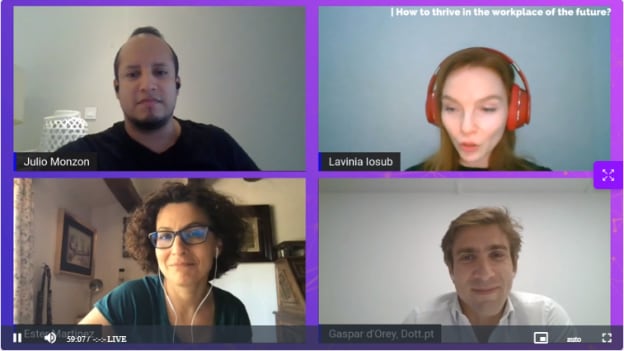How to thrive in the workplace of future

As companies adapt to the impact of COVID-19 and move to reinvent the workplace, professionals are entertaining the idea of becoming digital nomad/ remote gig workers to expand their own horizons of entrepreneurship. In a world where networking is fast becoming a quintessential aspect, Work Travel Summit brought a growing network of remote workers, digital professionals & entrepreneurs to connect with each other to discuss disruptive ideas, and figure out solutions to remote work challenges in the new normal in their first ever virtual conference.
In the show starter panel discussion titled ‘How to thrive in the workplace of future’, Lavinia Iosub, Founder - Remote Skills Academy moderated the session of industry leaders like Ester Martinez, CEO & Editor-in-Chief, People Matters, Julio Monzone, COO of Monetizemore and Gaspar D’Orey, CEO of Dott as they discussed and debated on how can professionals thrive in a remote workplace, the qualities need to thrive and understanding the nuances of the same.
Remote Work - will it become mainstream?
All the speakers in the panel had their own opinions on the idea of remote work becoming mainstream in future.
Ester Martinez, CEO & Editor-in-Chief, People Matters shared that employees and leaders both have the opportunity to learn to be flexible and value how flexibility will help them play different parenting roles in their lives. Though she emphasized that designing remote opportunities will have to be highly effective , she staunchly added that the future of work is hybrid.
Julio Monzone, COO of Monetizemore, talked about digital nomads’ rising popularity during the last few years and how the pandemic ascertained an individual choice to work remotely for better opportunities. Yet Julio did share that hybrid workplaces will be prominent in future; he doesn’t believe that they will become mainstream because traditional office setups will still exist and will be preferred.
Gaspar D’Orey, CEO of Dott, agreed with both the panelists and added that he would prefer for the employees to come back to work in offices post vaccination so that employees and organizations can design an opportunity to be remote-friendly.
DNA of a successful remote first company
When it comes to a remote first company, Ester shared that trust to choose what's best for the team and best for employees is really important in a remote setup. “We will be looking at ‘One size fits all’ policies that can be developed for the organization. We have to be careful about giving out simple plans for the team without defining them or explaining them to the employees. Here’s where the trust part comes.”
Though Gaspar talked about encouraging his employees to come back to offices, he did share : “Ultimately, let them do whatever they want. It's about trust and freedom and that's the principle we follow. If they can come, let them come. If they are comfortable working remotely then they can work the same.”
Julio believes that communication has to be clear and everyone working on their own has to be extremely resourceful. Employees don't have to be afraid of help and shared that his company has a system of ‘warzone chat’ just for calling up important meetings to troubleshoot. He emphasized that for a remote first company, mentality of ownership and productivity is of utmost importance.
Distinguishing a Remote First and a Remote Friendly company
Gaspar shared that they are the different sides of the same coin. He emphasized that both the aspects of the fully remote company involves ownership & trust to streamline productivity and achieve great results.
Yet Gaspar does believe that with time, he would like people to return to offices and work as he believes that working face to face without the virtual barrier will have a greater impact on the end product as well as employee’s workload.
For Julio, working remotely constitutes expanding the horizons of the world of work as talent is everywhere and returning to office will be very much like limiting ourselves back to where we were. He said, “If we find a candidate on Mars with an internet connection, wouldn’t we want to hire them? Why would we limit ourselves?”
He added that the element of trust will always be present and every employee is expected to be as productive as possible. Hence, when the right team member gets the proper freedom to take ownership, there’s a kind of magic to it to see the person grow in the role and succeed. Give them the platform to believe in themselves and that is possible through being remote first.
Agreeing with them, Ester also added that though the idea is experimentative, it gives everyone a chance to show humility to try and try again till they succeed. She shared that, “remote first gives us an opportunity to bring a holistic approach to our work where we self motivate ourselves, take ownership of the tasks and be accountable to the work we do. Employees would want to be freelancers in the future and they will look up to their organizations to provide a chance to explore the dimensions of entrepreneurship. The idea that will always persist in the current condition of work is - how to always be agile.”
The panel stressed immensely on ‘trust’ while working remotely and all of them were in agreement that it would never be a quick fix but has to be built over time. A system built around trust, ownership and productivity is quintessential for any remote workplace setup.















